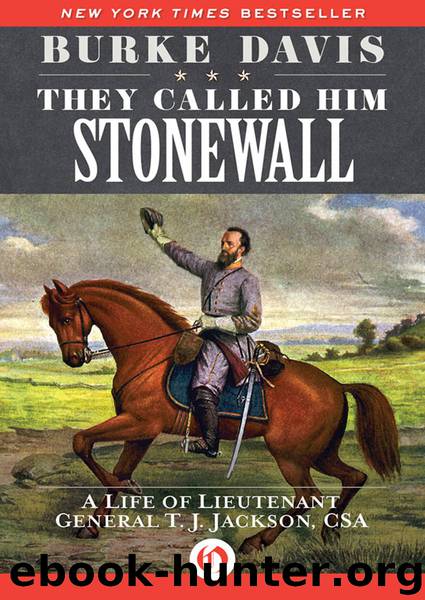They Called Him Stonewall by Davis Burke;

Author:Davis, Burke;
Language: eng
Format: epub
Publisher: Open Road Media
14
SEVEN BLOODY DAYS AT AN END
Jackson was once more out early, on July first, moving with such alacrity as to suggest that yesterday had been only a nightmare. He ordered stragglers rounded up and put into action. Ewell’s troops, who had joined late yesterday, now became the rear guard. The enemy had left the bridge crossing of the swamp, and the Valley army pushed on.
It was not an easy march. Water was scarce, for one thing; the retreating enemy had thrown medicines into the wells and springs to save them from Confederate hands, and the water could not be drunk. There were plentiful spoils to be gathered, however.
Jackson’s division went into the front of the entire army, once it had crossed the swamp. Before daybreak it made contact with the main force of Lee’s army, Magruder’s troops, who had come up late last night to relieve the worn regiments of Longstreet and A. P. Hill. The army pulled together in the early morning. Even General Huger advanced, finding his road now clear. The general officers sought Lee. On the Long Bridge Road, Lee met with Magruder, Longstreet and A. P. Hill. Some thought the commander had a wan look, and that the bitter disappointment of yesterday was in his face. Lee was calm and deferential in manner, however, as he spoke of the battle at Frayser’s Farm, and gave his orders for the day.
While these officers conferred, Jackson arrived at Willis Church, not far away. He had been active. Lee talked with a prisoner sent by Old Jack, a Federal surgeon taken at the Savage’s Station hospital, Dr. N. F. Marsh. This doctor asked for medicines and care for his wounded men. Lee offered all the help possible and began his efforts to have the wounded prisoners exchanged, a policy which was to endure for most of the war. Longstreet seized the occasion for espionage. He questioned Marsh as to the identity of Federal regiments the army had faced, but the doctor said he knew only General McCall’s division, to which he belonged. This general had been captured, and Longstreet, in his usual heavy fashion, bespoke his confidence for the day with:
“McCall is safe in Richmond; but if his division had not fought so stubbornly on this road, we would have captured your whole army. Never mind—we will do it yet.”
No other officers expressed such optimism. Lee, in fact, was dubious that he would be able even to direct affairs that day, because he was so weary that he could scarcely ride. He asked Longstreet to remain at his side so that the latter might take command of the army if the need arose. Lee and Longstreet now rode to Willis Church, where they met D. H. Hill, who was pessimistic indeed.
Hill told them that a chaplain from his division, the Reverend L. W. Allen, a native of this neighborhood, had given a doleful warning of the low bluff known as Malvern Hill, which rose, a mile and a half long and half a mile wide, in the swamp country near the banks of the James.
Download
This site does not store any files on its server. We only index and link to content provided by other sites. Please contact the content providers to delete copyright contents if any and email us, we'll remove relevant links or contents immediately.
| Afghan & Iraq Wars | American Civil War |
| American Revolution | Vietnam War |
| World War I | World War II |
Waking Up in Heaven: A True Story of Brokenness, Heaven, and Life Again by McVea Crystal & Tresniowski Alex(37772)
Empire of the Sikhs by Patwant Singh(23063)
We're Going to Need More Wine by Gabrielle Union(19023)
Hans Sturm: A Soldier's Odyssey on the Eastern Front by Gordon Williamson(18559)
Leonardo da Vinci by Walter Isaacson(13295)
The Radium Girls by Kate Moore(12005)
Tools of Titans by Timothy Ferriss(8354)
Educated by Tara Westover(8037)
How to Be a Bawse: A Guide to Conquering Life by Lilly Singh(7462)
Permanent Record by Edward Snowden(5820)
The Last Black Unicorn by Tiffany Haddish(5619)
The Rise and Fall of Senator Joe McCarthy by James Cross Giblin(5263)
Promise Me, Dad by Joe Biden(5132)
The Wind in My Hair by Masih Alinejad(5077)
A Higher Loyalty: Truth, Lies, and Leadership by James Comey(4942)
The Crown by Robert Lacey(4793)
The Iron Duke by The Iron Duke(4340)
Joan of Arc by Mary Gordon(4082)
Stalin by Stephen Kotkin(3945)
